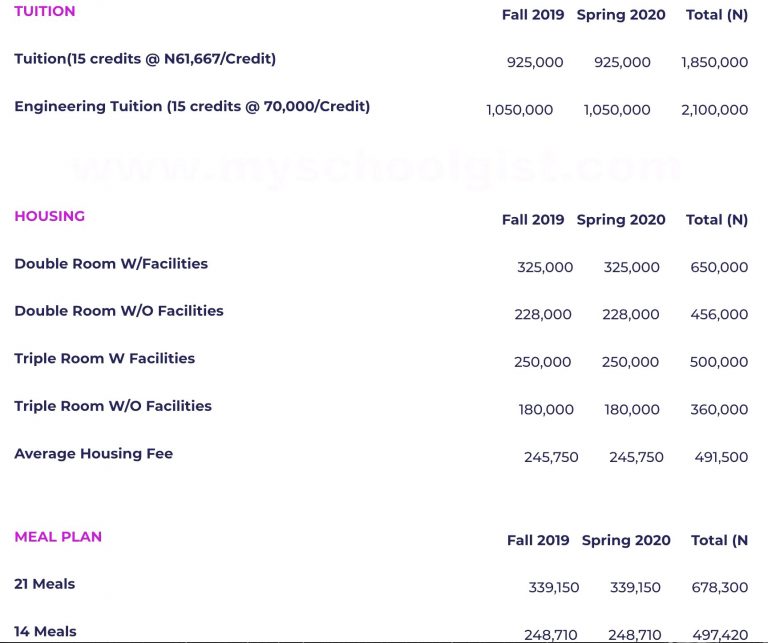When it comes to pursuing higher education, one of the critical factors that prospective students and their families consider is the cost of tuition.
For Amaj University, a reputable institution in Nigeria, the school fees for the academic year vary depending on the program and the level of study.
In this comprehensive guide, we’ll break down the tuition fees for both undergraduate and postgraduate programs, shed light on additional fees that students may encounter, and explore the university’s efforts to make education financially accessible through scholarships and financial aid opportunities.

Amaj University Overview
Amaj University, situated in the picturesque setting of Kwali, Abuja, Nigeria, is a relatively new but promising institution that has quickly made its mark in the world of higher education.
Established and approved by NUC in 2022 by Attahiru Bafarawa, a former governor of Sokoto State, this university offers a range of undergraduate and postgraduate programs in science, technology, engineering, and management.
In this post, I’ll delve deeper into what makes Amaj University stand out, exploring its campus, accreditations, programs, and the associated pros and cons of being a part of this institution.
Undergraduate Programs: Investing in Your Future
Amaj University offers a range of undergraduate programs designed to equip students with the knowledge and skills they need to excel in their chosen fields.
Below, we’ve outlined the tuition fees for these undergraduate programs for the academic year:
| Program | Tuition Fee (per year) |
|---|---|
| Undergraduate Programs: | |
| Accounting | N450,000 |
| Business Administration | N450,000 |
| Computer Science | N450,000 |
| Economics | N450,000 |
| Engineering (Civil, Electrical, Mechanical) | N500,000 |
| Law | N500,000 |
| Nursing | N450,000 |
| Pharmacy | N500,000 |
| Technology (Information Technology, Telecomm. Eng.) | N500,000 |
| Postgraduate Programs: | |
| Master of Business Administration (MBA) | N700,000 |
| Master of Science (MSc) in Computer Science | N650,000 |
| Master of Science (MSc) in Economics | N650,000 |
| Master of Laws (LLM) | N800,000 |
Please note that in addition to tuition fees, there may be other fees such as registration, examination, library, and hostel fees, which can vary based on the program and level of study.
1. Accounting: N450,000 per year
For aspiring accountants, the cost of tuition for the Accounting program stands at N450,000 per year.
This program prepares students for careers in finance, auditing, and financial management.
2. Business Administration: N450,000 per year
Those with entrepreneurial aspirations can pursue a degree in Business Administration for the same annual tuition of N450,000.
This program covers various aspects of business management and leadership.
3. Computer Science: N450,000 per year
In the digital age, the demand for computer science professionals is on the rise.
To join this dynamic field, students can enroll in the Computer Science program for N450,000 per year.
4. Economics: N450,000 per year
Economics enthusiasts can explore the world of market dynamics and economic policies through the Economics program, which also costs N450,000 annually.
5. Engineering (Civil, Electrical, Mechanical): N500,000 per year
Engineering programs, including Civil, Electrical, and Mechanical Engineering, require a slightly higher investment of N500,000 per year.
These programs open doors to careers in infrastructure, technology, and innovation.
6. Law: N500,000 per year
For those with a passion for justice and legal advocacy, the Law program is available at N500,000 per year.
This program paves the way for future lawyers and legal experts.
7. Nursing: N450,000 per year
The Nursing program, vital for healthcare, is offered at a tuition fee of N450,000 per year.
Nursing graduates play a crucial role in patient care and healthcare systems.
8. Pharmacy: N500,000 per year
Pharmacy, a field at the intersection of medicine and chemistry, offers rewarding career prospects.
The annual tuition fee for this program is N500,000.
9. Technology (Information Technology, Telecommunication Engineering): N500,000 per year
In a technology-driven world, the Technology program, covering Information Technology and Telecommunication Engineering, is priced at N500,000 per year.
Postgraduate Programs: Elevate Your Expertise
Amaj University also provides opportunities for individuals seeking postgraduate education.
Here are the tuition fees for postgraduate programs for the academic year:
1. Master of Business Administration (MBA): N700,000 per year
Ambitious professionals looking to advance their careers through an MBA can do so by investing N700,000 annually in the program.
An MBA can lead to leadership roles in various industries.
2. Master of Science (MSc) in Computer Science: N650,000 per year
The MSc in Computer Science program, priced at N650,000 per year, caters to those aiming to deepen their knowledge in the ever-evolving field of computer science.
3. Master of Science (MSc) in Economics: N650,000 per year
Economics enthusiasts can pursue an advanced degree in Economics by paying an annual tuition fee of N650,000.
This program delves into complex economic theories and policies.
4. Master of Laws (LLM): N800,000 per year
Aspiring legal scholars can enroll in the LLM program, which costs N800,000 per year.
This advanced legal education opens doors to specialized legal careers.
Additional Fees: Exploring the Costs Beyond Tuition
In addition to tuition fees, it’s essential to consider other fees that students may encounter during their academic journey at Amaj University.
These fees can vary based on the program and the level of study and may include:
- Registration Fee
- Examination Fee
- Library Fee
- Hostel Fee
The exact amounts for these fees can be obtained from the university’s official sources and should be factored into the overall cost of education.
Scholarships and Financial Aid: Making Education Accessible
It’s worth noting that while Amaj University’s tuition fees may be relatively high compared to other private universities in Nigeria, the institution is committed to making education accessible.
To achieve this goal, the university offers a range of scholarships and financial aid opportunities to eligible students.
These initiatives aim to reduce the financial burden on students and promote academic excellence.
Campus and Facilities: A Serene Haven for Learning
Amaj University’s campus is a haven for learning, set amidst a serene environment that fosters academic growth.
The institution has invested in modern facilities to provide students with a conducive learning atmosphere.
These facilities include:
- Lecture Halls: State-of-the-art lecture halls equipped with the latest teaching aids to enhance the learning experience.
- Laboratories: Well-equipped laboratories that cater to the practical needs of science and technology programs.
- Libraries: Extensive libraries with a vast collection of books, journals, and digital resources to support research and studies.
- Hostels: Comfortable hostels to accommodate students, ensuring a safe and convenient stay.
- Sports Complex: A sports complex for students to engage in physical activities and foster a healthy lifestyle.
- Health Center: A dedicated health center to cater to the medical needs of students and staff.
- Cafeteria: A cafeteria offering a variety of food options to keep students refreshed and energized throughout the day.
Accreditation and Membership: Quality Assured
Amaj University holds the prestigious accreditation from the National Universities Commission (NUC) of Nigeria, signifying that its academic programs meet the highest standards of quality and relevance.
Additionally, the university is a proud member of the Association of Commonwealth Universities (ACU), which provides it with global recognition and opportunities for collaboration and exchange with other esteemed institutions around the world.
Programs Offered: Nurturing Diverse Talents
Amaj University’s diverse range of programs ensures that students have ample choices to pursue their academic and career aspirations.
The programs offered include:
Undergraduate Programs:
- Accounting
- Business Administration
- Computer Science
- Economics
- Engineering (Civil, Electrical, Mechanical)
- Law
- Nursing
- Pharmacy
- Technology (Information Technology, Telecommunication Engineering)
Postgraduate Programs:
- Master of Business Administration (MBA)
- Master of Science (MSc) in Computer Science
- Master of Science (MSc) in Economics
- Master of Laws (LLM)
Tuition Fees: A Consideration for Prospective Students
One of the essential aspects for prospective students to weigh is the cost of tuition.
Amaj University’s tuition fees vary depending on the program and level of study.
For example, undergraduate programs like Accounting have an annual tuition fee of N450,000, while the postgraduate MBA program costs N700,000 per year.
It’s important to consider these fees alongside the university’s offerings and the potential for career growth.
Pros and Cons: Making an Informed Decision
As with any educational institution, there are pros and cons associated with attending Amaj University:
Pros:
- Modern Facilities: The university boasts modern facilities that enhance the learning experience.
- Accreditation: Accredited by the NUC, ensuring that academic standards are met.
- Global Connection: Membership in the ACU opens doors to global opportunities and collaborations.
- Serene Environment: Located in a serene environment, ideal for focused learning.
Cons:
- Tuition Fees: Being a private university, tuition fees are relatively high compared to public institutions.
- Limited Data: As a relatively new university, there may be limited data available on the success of its graduates.
- Rural Location: The university’s rural location may pose challenges in terms of access to amenities.
Conclusion
In conclusion, when considering Amaj University for your higher education journey, it’s essential to weigh the cost of tuition against the value of the programs offered and the potential for future career growth.
The university’s commitment to providing financial assistance through scholarships and financial aid programs underscores its dedication to empowering students and fostering a vibrant learning community.
By investing in your education at Amaj University, you’re not just paying for tuition; you’re investing in your future and the knowledge and skills that will shape it.
Also see:
Franco British International University School Fees

Hello, I’m Emeka by name, an article writer with a passion for words and storytelling. I have a knack for crafting engaging and informative content that captivates readers and delivers valuable insights. Whether it’s exploring the latest trends, sharing knowledge, or diving into creative narratives, I’m here to bring words to life. Join me on a journey through the world of ideas and stories as we explore the power of written expression.





